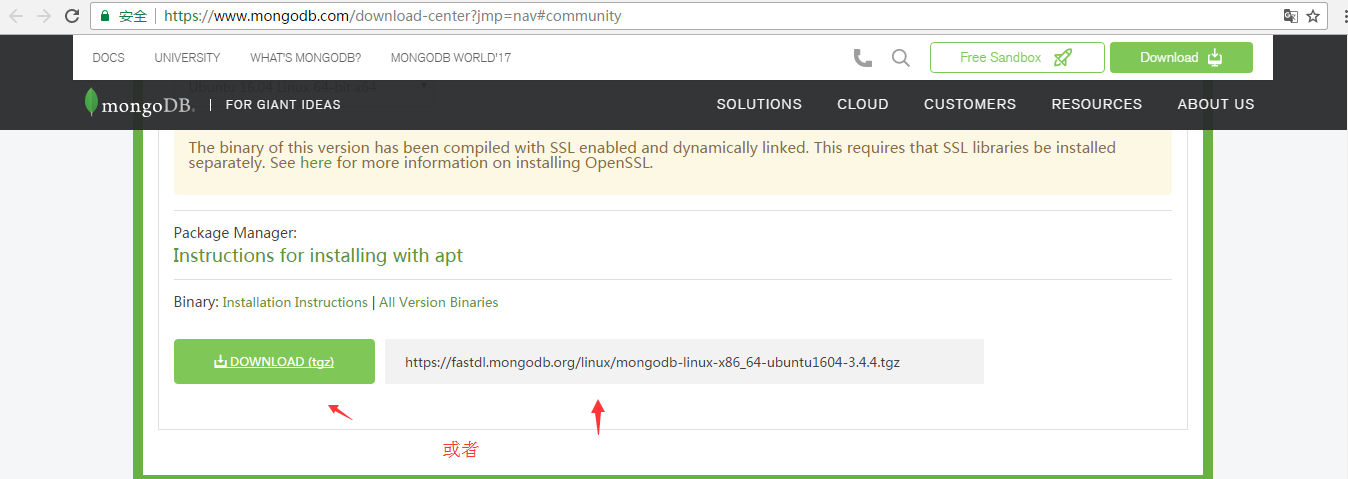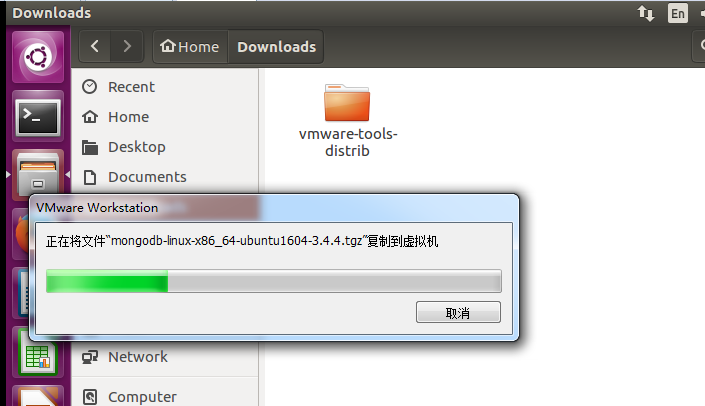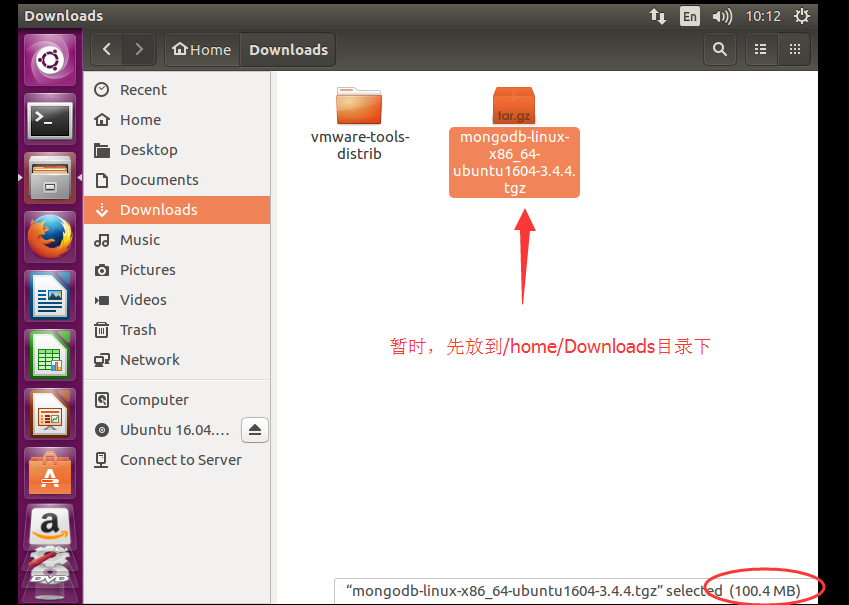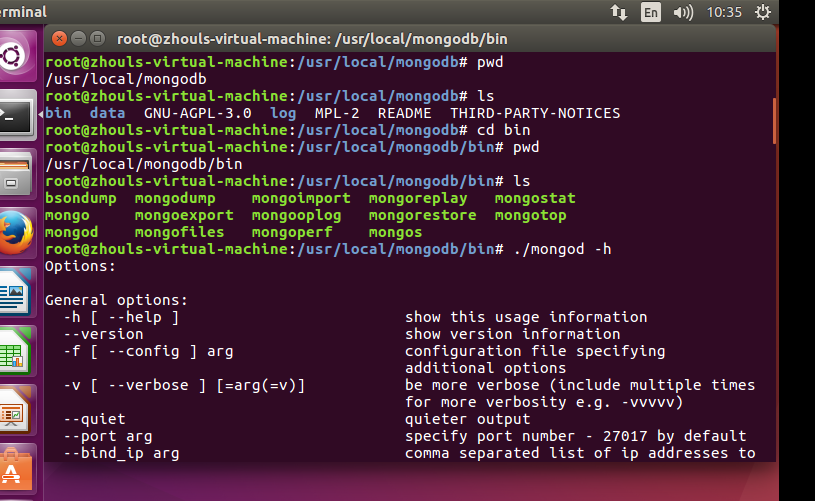Ubuntu16.04下Mongodb(离线安装方式|非apt-get)安装部署步骤(图文详解)(博主推荐)
不多说,直接上干货!
说在前面的话
首先,查看下你的操作系统的版本。

root@zhouls-virtual-machine:~# cat /etc/issue Ubuntu 16.04.1 LTS \n \l root@zhouls-virtual-machine:~#
我的是Ubuntu 16.04.4
我的环境在Ubuntu16.04下搭建,注意:不同版本之间可能存在兼容性(其他的如14.04,我也暂时测试过)
Ubuntu14.04下Mongodb安装部署步骤(图文详解)

root@zhouls-virtual-machine:~# mongo
The program 'mongo' is currently not installed. You can install it by typing:
apt-get install mongodb-clients
root@zhouls-virtual-machine:~#
这里,建议大家不要直接就输入apt-get install mongodb-clients来安装。
这样有两点问题:
1.安装的是客户端
2.版本问题,这个很重要,项目中mongo数据库用的是2.6,而apt-get自动安装的根本不知道是什么版本,而mongodb不同版本之间是不能兼容的。所以如果根据需要是迁移数据库之类的,这样到后面会有超级一大堆的错误。
Mongodb安装包的下载
mongo官网下载地址 (进入)
根据自己的需要选择版本下载,需要注意亮点:
1.大版本保持一致,因为大版本之间不兼容
2.mongodb亦按照基数版本不稳定的规则,一般用于生产环境的都是偶数版本,如果安装的是基数(例如2.7),进入时会出现一下提示。
我这里,就选择最简单的和免费的,社区服务版本。
我一般喜欢用tar.gz来下载安装,当然大家也可以选择用rpm方式来安装。

我这里,就选择最简单的和免费的,社区服务版本。
https://fastdl.mongodb.org/linux/mongodb-linux-x86_64-ubuntu1604-3.4.4.tgz

我一般喜欢用tar.gz来下载安装,当然大家也可以选择用rpm方式来安装。
https://fastdl.mongodb.org/linux/mongodb-linux-x86_64-ubuntu1604-3.4.4.tgz

或者
大家,也可以安装最新的稳定版 MongoDB 或指定版本的 MongoDB。
安装MongoDB最新的稳定版本
使用下列命令:
sudo apt-get install -y mongodb-org
如果你想安装指定版本的MongoDB,请按照下面的方法。
下面的例子安装 3.2.0 版本的 MongoDB:
MongoDB的不同组件都可以指定相应的版本号
sudo apt-get install -y mongodb-org=3.2.0 mongodb-org-server=3.2.0 mongodb-org-shell=3.2.0 mongodb-org-mongos=3.2.0 mongodb-org-tools=3.2.0
mongodb的安装部署
下载解压
我这里,先暂时是,放在/home/zhouls/Downloads/下




zhouls@zhouls-virtual-machine:~/Downloads$ sudo -s [sudo] password for zhouls: root@zhouls-virtual-machine:~/Downloads# pwd /home/zhouls/Downloads root@zhouls-virtual-machine:~/Downloads# ls mongodb-linux-x86_64-ubuntu1604-3.4.4.tgz vmware-tools-distrib root@zhouls-virtual-machine:~/Downloads# tar -zxvf mongodb-linux-x86_64-ubuntu1604-3.4.4.tgz mongodb-linux-x86_64-ubuntu1604-3.4.4/README mongodb-linux-x86_64-ubuntu1604-3.4.4/THIRD-PARTY-NOTICES mongodb-linux-x86_64-ubuntu1604-3.4.4/MPL-2 mongodb-linux-x86_64-ubuntu1604-3.4.4/GNU-AGPL-3.0 mongodb-linux-x86_64-ubuntu1604-3.4.4/bin/mongodump mongodb-linux-x86_64-ubuntu1604-3.4.4/bin/mongorestore mongodb-linux-x86_64-ubuntu1604-3.4.4/bin/mongoexport mongodb-linux-x86_64-ubuntu1604-3.4.4/bin/mongoimport mongodb-linux-x86_64-ubuntu1604-3.4.4/bin/mongostat mongodb-linux-x86_64-ubuntu1604-3.4.4/bin/mongotop mongodb-linux-x86_64-ubuntu1604-3.4.4/bin/bsondump mongodb-linux-x86_64-ubuntu1604-3.4.4/bin/mongofiles mongodb-linux-x86_64-ubuntu1604-3.4.4/bin/mongooplog mongodb-linux-x86_64-ubuntu1604-3.4.4/bin/mongoreplay mongodb-linux-x86_64-ubuntu1604-3.4.4/bin/mongoperf mongodb-linux-x86_64-ubuntu1604-3.4.4/bin/mongod mongodb-linux-x86_64-ubuntu1604-3.4.4/bin/mongos mongodb-linux-x86_64-ubuntu1604-3.4.4/bin/mongo root@zhouls-virtual-machine:~/Downloads#
mongodb不需要像别的数据库那样配置解压后放到/usr/local
但是为了方便管理,最好还是放到usr/local下面。
命令如下:

root@zhouls-virtual-machine:~/Downloads# ls mongodb-linux-x86_64-ubuntu1604-3.4.4 vmware-tools-distrib mongodb-linux-x86_64-ubuntu1604-3.4.4.tgz root@zhouls-virtual-machine:~/Downloads# mv mongodb-linux-x86_64-ubuntu1604-3.4.4 /usr/local/mongodb root@zhouls-virtual-machine:~/Downloads# cd /usr/local root@zhouls-virtual-machine:/usr/local# pwd /usr/local root@zhouls-virtual-machine:/usr/local# ls bin etc games include lib man mongodb sbin share src root@zhouls-virtual-machine:/usr/local#
初步认识下,mongdb的目录结构

root@zhouls-virtual-machine:/usr/local/mongodb# pwd /usr/local/mongodb root@zhouls-virtual-machine:/usr/local/mongodb# ls bin GNU-AGPL-3.0 MPL-2 README THIRD-PARTY-NOTICES root@zhouls-virtual-machine:/usr/local/mongodb#
然后为了mongodb创建存储数据的文件目录和日志文件目录

root@zhouls-virtual-machine:/usr/local/mongodb# pwd /usr/local/mongodb root@zhouls-virtual-machine:/usr/local/mongodb# ls bin GNU-AGPL-3.0 MPL-2 README THIRD-PARTY-NOTICES root@zhouls-virtual-machine:/usr/local/mongodb# mkdir data root@zhouls-virtual-machine:/usr/local/mongodb# mkdir log root@zhouls-virtual-machine:/usr/local/mongodb# ls bin data GNU-AGPL-3.0 log MPL-2 README THIRD-PARTY-NOTICES root@zhouls-virtual-machine:/usr/local/mongodb#
进入到mongodb下面的bin里面查看mongodb帮助文档

root@zhouls-virtual-machine:/usr/local/mongodb# pwd /usr/local/mongodb root@zhouls-virtual-machine:/usr/local/mongodb# ls bin data GNU-AGPL-3.0 log MPL-2 README THIRD-PARTY-NOTICES root@zhouls-virtual-machine:/usr/local/mongodb# cd bin root@zhouls-virtual-machine:/usr/local/mongodb/bin# pwd /usr/local/mongodb/bin root@zhouls-virtual-machine:/usr/local/mongodb/bin# ls bsondump mongodump mongoimport mongoreplay mongostat mongo mongoexport mongooplog mongorestore mongotop mongod mongofiles mongoperf mongos root@zhouls-virtual-machine:/usr/local/mongodb/bin# ./mongod -h Options: General options: -h [ --help ] show this usage information --version show version information -f [ --config ] arg configuration file specifying additional options -v [ --verbose ] [=arg(=v)] be more verbose (include multiple times for more verbosity e.g. -vvvvv) --quiet quieter output --port arg specify port number - 27017 by default --bind_ip arg comma separated list of ip addresses to listen on - all local ips by default --ipv6 enable IPv6 support (disabled by default) --maxConns arg max number of simultaneous connections - 1000000 by default --logpath arg log file to send write to instead of stdout - has to be a file, not directory --syslog log to system's syslog facility instead of file or stdout --syslogFacility arg syslog facility used for mongodb syslog message --logappend append to logpath instead of over-writing --logRotate arg set the log rotation behavior (rename|reopen) --timeStampFormat arg Desired format for timestamps in log messages. One of ctime, iso8601-utc or iso8601-local --pidfilepath arg full path to pidfile (if not set, no pidfile is created) --keyFile arg private key for cluster authentication --noauth run without security --setParameter arg Set a configurable parameter --httpinterface enable http interface --transitionToAuth For rolling access control upgrade. Attempt to authenticate over outgoing connections and proceed regardless of success. Accept incoming connections with or without authentication. --clusterAuthMode arg Authentication mode used for cluster authentication. Alternatives are (keyFile|sendKeyFile|sendX509|x509) --nounixsocket disable listening on unix sockets --unixSocketPrefix arg alternative directory for UNIX domain sockets (defaults to /tmp) --filePermissions arg permissions to set on UNIX domain socket file - 0700 by default --fork fork server process --networkMessageCompressors arg Comma-separated list of compressors to use for network messages --auth run with security --jsonp allow JSONP access via http (has security implications) --rest turn on simple rest api --slowms arg (=100) value of slow for profile and console log --profile arg 0=off 1=slow, 2=all --cpu periodically show cpu and iowait utilization --sysinfo print some diagnostic system information --noIndexBuildRetry don't retry any index builds that were interrupted by shutdown --noscripting disable scripting engine --notablescan do not allow table scans --shutdown kill a running server (for init scripts) Replication options: --oplogSize arg size to use (in MB) for replication op log. default is 5% of disk space (i.e. large is good) Master/slave options (old; use replica sets instead): --master master mode --slave slave mode --source arg when slave: specify master as <server:port> --only arg when slave: specify a single database to replicate --slavedelay arg specify delay (in seconds) to be used when applying master ops to slave --autoresync automatically resync if slave data is stale Replica set options: --replSet arg arg is <setname>[/<optionalseedhostlist >] --replIndexPrefetch arg specify index prefetching behavior (if secondary) [none|_id_only|all] --enableMajorityReadConcern enables majority readConcern Sharding options: --configsvr declare this is a config db of a cluster; default port 27019; default dir /data/configdb --shardsvr declare this is a shard db of a cluster; default port 27018 SSL options: --sslOnNormalPorts use ssl on configured ports --sslMode arg set the SSL operation mode (disabled|allowSSL|preferSSL|requireSSL ) --sslPEMKeyFile arg PEM file for ssl --sslPEMKeyPassword arg PEM file password --sslClusterFile arg Key file for internal SSL authentication --sslClusterPassword arg Internal authentication key file password --sslCAFile arg Certificate Authority file for SSL --sslCRLFile arg Certificate Revocation List file for SSL --sslDisabledProtocols arg Comma separated list of TLS protocols to disable [TLS1_0,TLS1_1,TLS1_2] --sslWeakCertificateValidation allow client to connect without presenting a certificate --sslAllowConnectionsWithoutCertificates allow client to connect without presenting a certificate --sslAllowInvalidHostnames Allow server certificates to provide non-matching hostnames --sslAllowInvalidCertificates allow connections to servers with invalid certificates --sslFIPSMode activate FIPS 140-2 mode at startup Storage options: --storageEngine arg what storage engine to use - defaults to wiredTiger if no data files present --dbpath arg directory for datafiles - defaults to /data/db --directoryperdb each database will be stored in a separate directory --noprealloc disable data file preallocation - will often hurt performance --nssize arg (=16) .ns file size (in MB) for new databases --quota limits each database to a certain number of files (8 default) --quotaFiles arg number of files allowed per db, implies --quota --smallfiles use a smaller default file size --syncdelay arg (=60) seconds between disk syncs (0=never, but not recommended) --upgrade upgrade db if needed --repair run repair on all dbs --repairpath arg root directory for repair files - defaults to dbpath --journal enable journaling --nojournal disable journaling (journaling is on by default for 64 bit) --journalOptions arg journal diagnostic options --journalCommitInterval arg how often to group/batch commit (ms) WiredTiger options: --wiredTigerCacheSizeGB arg maximum amount of memory to allocate for cache; defaults to 1/2 of physical RAM --wiredTigerStatisticsLogDelaySecs arg (=0) seconds to wait between each write to a statistics file in the dbpath; 0 means do not log statistics --wiredTigerJournalCompressor arg (=snappy) use a compressor for log records [none|snappy|zlib] --wiredTigerDirectoryForIndexes Put indexes and data in different directories --wiredTigerCollectionBlockCompressor arg (=snappy) block compression algorithm for collection data [none|snappy|zlib] --wiredTigerIndexPrefixCompression arg (=1) use prefix compression on row-store leaf pages root@zhouls-virtual-machine:/usr/local/mongodb/bin#
找到参数
--fork
--dbpath arg
--logpath arg
--nohttpinterface
启动 MongoDB数据库
使用下列命令启动 mongod 进程。
sudo service mongod start
或者
启动数据库(推荐)
./mongod --dbpath=/usr/local/mongodb/data/ --fork --logpath=/usr/local/mongodb/log
--dbpath=/usr/local/mongodb/data/ 用于指定存放的mongodb数据库
--fork 是后台执行,不然一直在前台
--logpath=/usr/local/mongodb/log用于指定mongodb的日志记录文件

mongodb启动时报错ERROR: child process failed, exited with error number 1
检查 MongoDB 是否成功启动
通过检查 /var/log/mongodb/mongod.log 文件来确定 mongod 进程是否已经成功启动。
或者查看进程
ps -ef | grep mongod

root@zhouls-virtual-machine:~# ps -ef | grep mongod root 6072 4783 1 11:09 ? 00:00:01 ./mongod --dbpath=/usr/local/mongodb/data/ --fork --logpath=/usr/local/mongodb/log root 6138 6126 0 11:12 pts/11 00:00:00 grep --color=auto mongod root@zhouls-virtual-machine:~#
启动后即可通过mongo命令进入数据库


如果大家按照上面的步骤来,安装之后,还是出现这样的情况的话,则那么直接,用apt install mongodb-clients吧。
停止 MongoDB
sudo service mongod stop
重新启动 MongoDB
sudo service mongod restart
作者:大数据和人工智能躺过的坑
出处:http://www.cnblogs.com/zlslch/
本文版权归作者和博客园共有,欢迎转载,但未经作者同意必须保留此段声明,且在文章页面明显位置给出原文链接,否则保留追究法律责任的权利。
如果您认为这篇文章还不错或者有所收获,您可以通过右边的“打赏”功能 打赏我一杯咖啡【物质支持】,也可以点击右下角的【好文要顶】按钮【精神支持】,因为这两种支持都是我继续写作,分享的最大动力!



